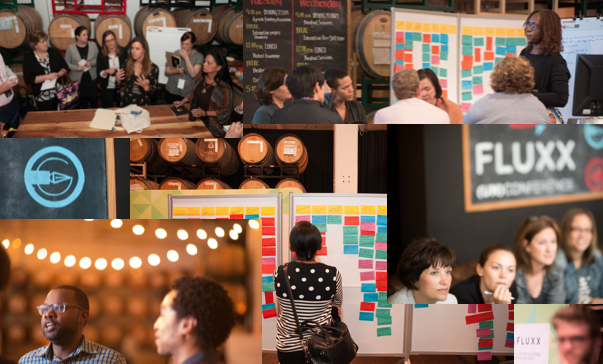 Scenes from the 2015 Fluxx (Un)Conference
Scenes from the 2015 Fluxx (Un)Conference
From the moment we decided to bring the entire Fluxx community together to learn, share, and collaborate in an urban winery in San Francisco for two days, we knew the folks who use Fluxx everyday to manage their grants had to play the starring role.
And that’s exactly what they did. In fact, they were super stars.
We had another guiding principle leading up to the event: conferences shouldn’t suck. It’s that simple. If you’ve got a conference on the horizon, remember these three basic ideas to ensure your next community gathering doesn’t suck:
-
It’s about your community, not you.
-
Make it useful.
-
Listen, listen, listen.
It’s about your community, not you.
The First Annual Fluxx (Un)Conference was never going to be a litany of speakers on a stage or experts leading panel discussions. We wanted to do something different – something that put our community first.
You may be familiar with the idea of an “unconference”: no topics are predetermined, no keynote speakers invited, no panels arranged. Instead, the success of the event depends 100 percent on attendee participation.
Our attendees are some of the brightest minds in the world of philanthropy, whose respective foundations are responsible for a collective $5 billion a year in grantmaking. It’s not easy for busy philanthropic professionals to hop on a plane, fly to California, and show up at a winery without knowing exactly what they signed up for. But knowing that we like to do things just a little bit differently, they were more than willing to take the leap of faith and for that we are grateful.
The conference was led by Misty Avila from Aspiration, who, in a flurry of post it notes and Sharpies, somehow managed to harness the greatness before her. She clearly had a method to her madness and our community showed an amazing amount of chutzpah in pulling this thing off. We’re so impressed with the enthusiasm with which all the participants jumped into the fray to create a first-class experience.
One of our primary goals for the gathering was to create a community atmosphere that created space not only for learning and collaboration, but also for making serendipitous connections among Fluxx users.
“Making connections and creating a sense of belonging are key elements in a strong community,” Mandy Skypala told me recently. Mandy is the Grants Specialist at the Minnesota Historical Society. “A gathering like this makes it possible for people who are part of the community to connect with each other and share ideas and solutions to common problems and issues.”
Make it useful.
For example, Mandy facilitated two breakout sessions that led to valuable conversations about the usability of key features within Fluxx. These sessions, attended by more than 25 Fluxx users, generated awesome product ideas that are already being incorporated into the product roadmap.
We also ran “Speed Geeking” sessions, which consisted of 12 stations, each covering a different function or feature of Fluxx, lasting 2 to 3 minutes apiece. Attendees, like Sandra Ngwena, from South Africa, were able to see practical applications of features they may not have had the opportunity to use yet in their daily work. It was Sandra’s favorite part of the entire two days.
A community gathering like this is important to ensure that we are all maximizing what we are able to do with Fluxx, Sandra, the Director of Operations at The DG Murray Trust, told me after the conference.
Listen, listen, listen.
Did I mention sticky notes? We’ve combed through at least 5 billion sticky notes (maybe not quite that many), each with a thought, idea, request, or key point to remember. And when I say combed through, I mean we read, sorted, and catalogued all these ideas. We listened. Then we compiled and posted the ideas onto our community website so that the conversation can continue.
In response to this and other feedback, plans are already underway for regional in-person meetups, peer-led webinars, and other community-based learning experiences. We’re also using community feedback to help prioritize and define future product development. Specifically, we’ve had a lot of great conversations about the direction of our new Impact Intelligence tool.
We take community seriously. We know we exist because of our users, and we’re dedicated to taking the time to develop relationships with (and within) the community. We’d be fools not to. The best part is, when you make the community the centerpiece of your conference, you end up having a blast. We can’t wait until next year.